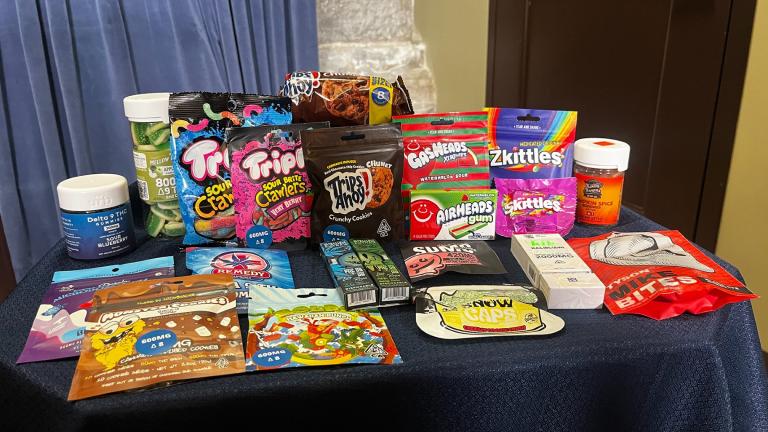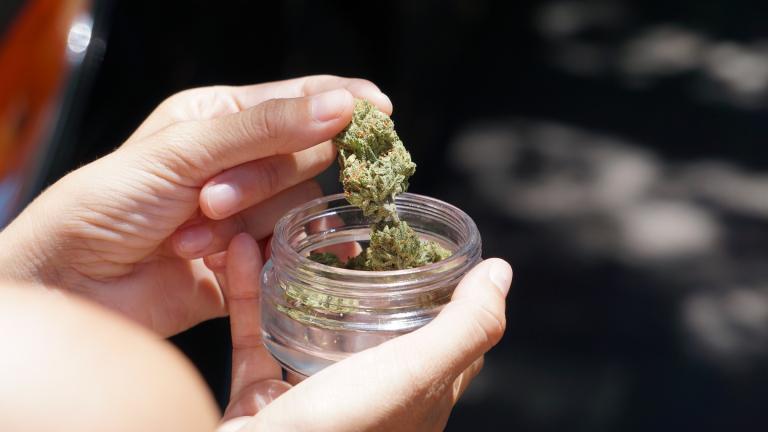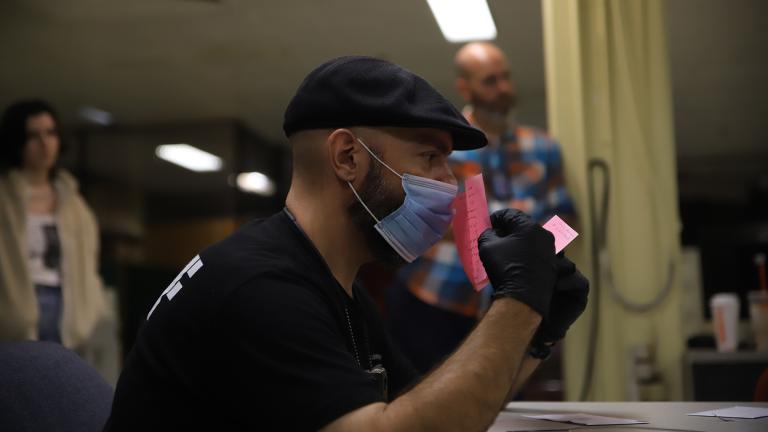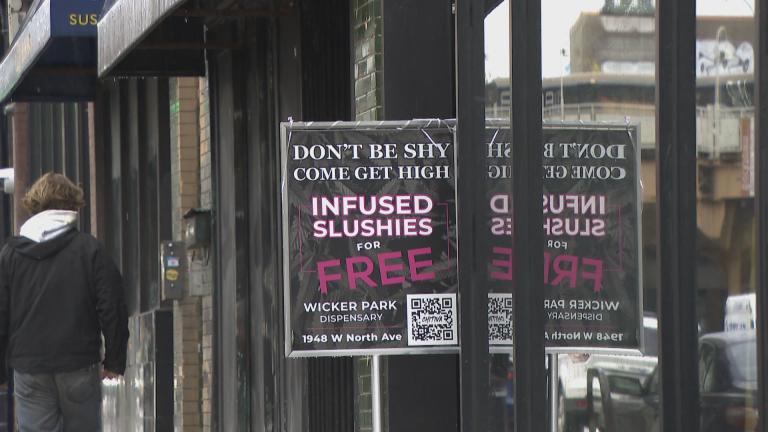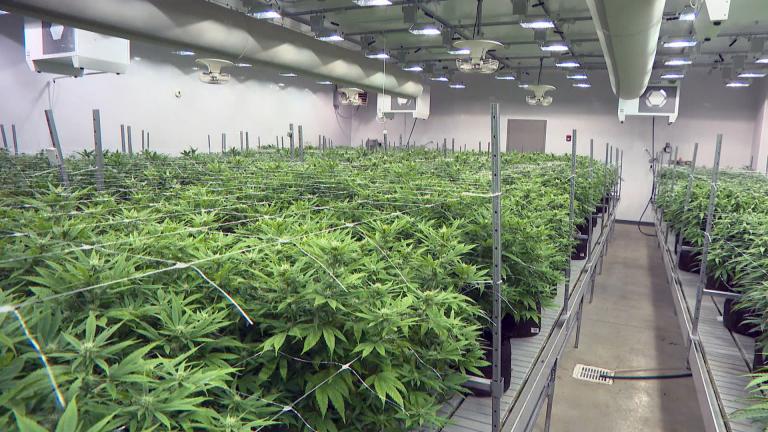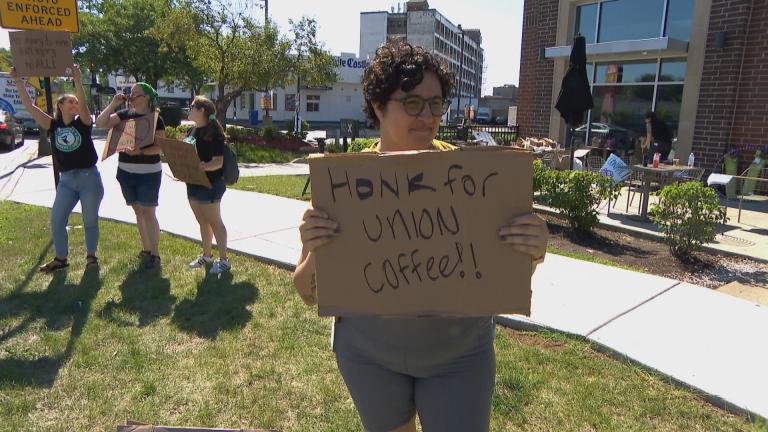Chicago’s cannabis companies and aficionados celebrated 4/20 with contests, concerts, a yoga workshop and chef specials. (Paulie Gee’s Wicker Park location served up pizza slices topped with gooey nacho cheese, Flamin’ Hot Cheetohs and jalapenos.)
But many people of color looking to break into the legal cannabis industry aren’t celebrating.
Nearly two-and-a-half years after recreational cannabis became legal to sell in Illinois, state Rep. La Shawn Ford (D-Chicago) says Illinois has failed to live up to the promise of the law.
“The people that we intended to be emerging in this market have not yet emerged because they are still tied up in court. And those are the Black people and Brown people that really actually have been a target of the war on drugs,” Ford said. “So right now the law, for the intent, has failed.”
Gov. J.B. Pritzker and other backers touted Illinois’ marijuana law as a path to right those wrongs, with promises of social equity, meaning that the law would be used to lift communities and individuals most impacted by drug prosecutions.
Instead, the only places to legally buy weed in Illinois now are “legacy owners” — those connected to dispensaries that opened back in 2015, when Illinois opened the doors to medical marijuana.
Another 185 groups that competed and won state licenses to open new dispensaries under the social equity process are still waiting because of lawsuits filed by those that lost.
Ford says flaws in the original bill opened the state up to that litigation.
“People are ticked and they have every right to be ticked because they put their life investments in this and they may not be able to weather the storm,” Ford said.
Count Frank Cowan among those who are “ticked.”
Cowan’s part of Planet 13 Illinois, which won a coveted license. The partnership has plans to open a dispensary — Cowan won’t say where specifically just yet — that he says is more than the dispensaries that look like doctor’s offices; he’s thinking retail, maybe a restaurant.
But all of that is on hold.
Cowan said because he has financial backing from a group with a multi-state presence, he can hold on. Still, the hoped-for location is in limbo, and he’s worried about others that don’t have connections to an entity with deep pockets.
“We’re still spending money on attorneys, we’re still spending money on zoning experts, I mean we’re spending money and we don’t have an end in sight. There will be some of us — when I say ‘us’ I’m talking about us 185 lottery winners — that won’t be financially situated to open because it’s taken so long,” Cowan said. “People have lost employees because of this. People have lost financial backing because of this.”
There has been plenty of green — as in cash — since Illinois legalized marijuana with nearly $1.4 billion dollars of sales in 2021.
Ford said despite the fumbles of the law’s intent on social equity, that’s a success because it brings tax money to state coffers, which in cases are sent back to neighborhoods distressed when law enforcement disproportionately went after their residents for drug crimes.
Cowan said the delays in expanding the market are unjustifiable, and a missed opportunity for more.
“If I were open I would probably add about 200 jobs. Not to mention all the other 184 applicants that would be adding jobs. If we were all open, instead of the state generating $1.37 billion we’d probably generate closer to $2 billion because there’d be more locations across the state and with that extra $630 million there’d be extra tax revenue generated as well,” Cowan said. “So the state is losing out, employees are losing out and we’re losing out. The only people are the legacy dispensary owners.”
State Rep. Curtis Tarver says Illinois erred in the first place when it passed the cannabis legalization law. He said he said drafters were ultra-cautious about not wanting to invite lawsuits by giving too much priority in the license application process based on social equity and racial qualifications.
Instead, it’s those who can least afford it who are beset by litigation. He said there’s little legislators can do while various lawsuits wind their way through the courts.
“I don’t know that we ultimately will legislate our way out of this,” Tarver said. “The original 678-page bill was so flawed, I’m not sure that there’s legislative solutions. There was a lot of concern initially when I was in conversations and trying to push back on some of these things, about their being litigation if we went too far as far as providing equity. And now we’re in a situation where there’s litigation regardless. And the people often who can least afford to be litigated are the ones fighting for their opportunities.”
Once the courts weigh in, he said Illinois can make more moves.
“I think in many regards, the (opportunity there was in the beginning) is forever gone. But that does not mean that there’s no opportunity,” Tarver said. “Until that time when we don’t know what the rulings are going to be, it’s difficult to legislate … we have to wait for the courts to interpret some of this legislation. I don’t think we’ll ever get where the promise is that we would have been. But my hope, and a little bit of optimism, is that we’ll be beyond where we are today.”
There are more licenses to release.
Tarver said the recently-passed state budget should have put less emphasis on small tax relief measures, like a grocery tax suspension that will save a penny on a $10 food purchase, and more on dedicating millions to help incubate equity-driven and minority women and disability-owned businesses so they can be in position to take advantage of opportunities like these.
“I’ve heard no one say every time they spend $2,500 on groceries they save $25,” Tarver said. “I’ve heard more people say, hey that $500 million … could stay in the kitty, and then we’d have more money for, whether it’s public safety, whether it’s for entrepreneurship programs for Black and Brown business.”
While the budget did “some good things” Tarver said constituents in his district are “less than satisfied.”
“There is so much more that we could have done I think, instead of the feel-good that is really not doing very much at all,” Tarver said.
Meanwhile other issues plague the cannabis industry related to the hold-up in licensing.
Craft grow licenses awarded to companies to cultivate marijuana are seeking the ability to grow more than the limited amounts they’re allowed in current law, in order to make building-up their business more lucrative and sustainable, but that (SB3105) didn’t pass.
Those in on negotiations say part of the reason for the measure stalled is because current cultivators pushed back on new competition. There’s also concern that if craft grow licensees may go under if they try to expand their canopy space too rapidly.
Without new dispensaries to sell cannabis, those awarded licenses to transport marijuana have nowhere to bring product to.
Illinois also didn’t act this session on an effort to prevent companies from firing workers who test positive for marijuana (HB1146).
Cowan, meanwhile, is trying make folks aware of the stalled license situation.
“People in Illinois, they don’t realize that you go to your local dispensary and there’s no Black and Brown people that own any of those dispensaries. Illinois touted how much of a success this program was but people don’t know that it’s an utter failure because none of us have a physical location that we can go to and try to be profitable,” Cowan said. “We’re trying to create generational wealth for us and our families and we’re getting shot in the foot.”
The marijuana law also paved the path for expunging crimes associated with marijuana, clearing the records of those convicted of drug crimes that would now be legal.
According to a press release issued by the Cook County state’s attorney’s office, Kim Foxx will present 214 cannabis cases to be expunged, for a total of more than 15,000 expunged cases the past several years.
Foxx says there’s insufficient data to expunge another nearly 600 cases in the system.
Follow Amanda Vinicky on Twitter: @AmandaVinicky

